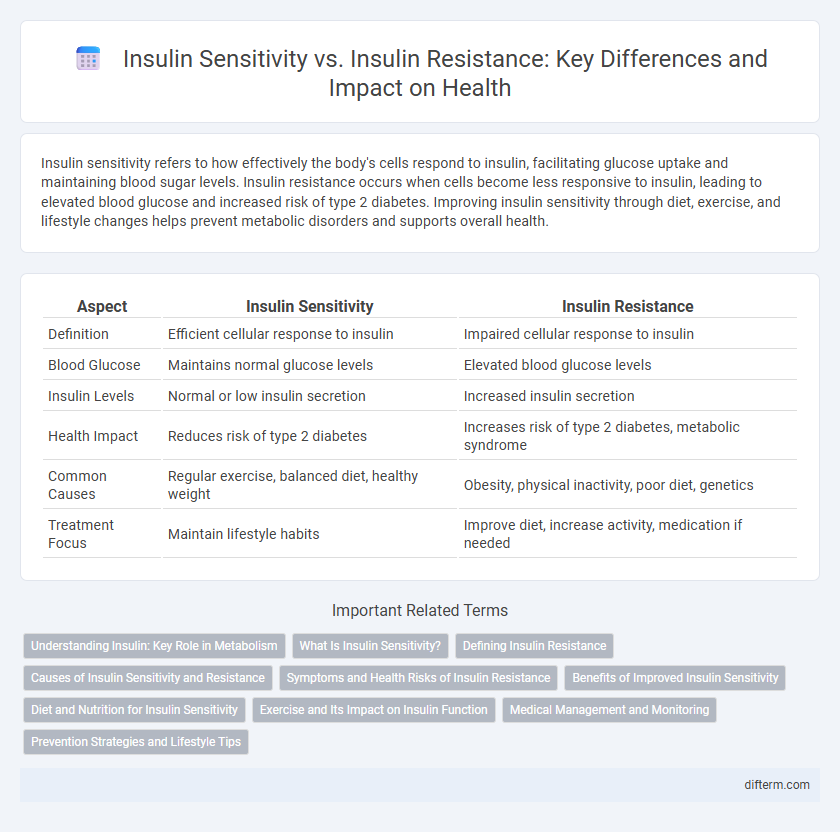Insulin sensitivity refers to how effectively the body's cells respond to insulin, facilitating glucose uptake and maintaining blood sugar levels. Insulin resistance occurs when cells become less responsive to insulin, leading to elevated blood glucose and increased risk of type 2 diabetes. Improving insulin sensitivity through diet, exercise, and lifestyle changes helps prevent metabolic disorders and supports overall health.
Table of Comparison
| Aspect | Insulin Sensitivity | Insulin Resistance |
|---|---|---|
| Definition | Efficient cellular response to insulin | Impaired cellular response to insulin |
| Blood Glucose | Maintains normal glucose levels | Elevated blood glucose levels |
| Insulin Levels | Normal or low insulin secretion | Increased insulin secretion |
| Health Impact | Reduces risk of type 2 diabetes | Increases risk of type 2 diabetes, metabolic syndrome |
| Common Causes | Regular exercise, balanced diet, healthy weight | Obesity, physical inactivity, poor diet, genetics |
| Treatment Focus | Maintain lifestyle habits | Improve diet, increase activity, medication if needed |
Understanding Insulin: Key Role in Metabolism
Insulin is a hormone crucial for regulating blood glucose levels, facilitating cellular glucose uptake, and supporting metabolic processes. Insulin sensitivity refers to how effectively cells respond to insulin, promoting efficient energy use and maintaining balanced blood sugar levels. In contrast, insulin resistance impairs cellular response, often leading to elevated blood glucose and increasing the risk of type 2 diabetes and metabolic syndrome.
What Is Insulin Sensitivity?
Insulin sensitivity refers to how effectively the body's cells respond to the hormone insulin, enabling efficient glucose uptake from the bloodstream. High insulin sensitivity allows cells to use blood glucose for energy more effectively, reducing the risk of type 2 diabetes and metabolic syndrome. Improving insulin sensitivity can be achieved through regular physical activity, a balanced diet rich in fiber, and maintaining a healthy weight.
Defining Insulin Resistance
Insulin resistance occurs when cells in muscles, fat, and the liver become less responsive to insulin, resulting in impaired glucose uptake and elevated blood sugar levels. This metabolic condition forces the pancreas to produce more insulin to maintain normal glucose levels, often leading to hyperinsulinemia. Insulin resistance is a key factor in the development of type 2 diabetes, metabolic syndrome, and increased cardiovascular risk.
Causes of Insulin Sensitivity and Resistance
Insulin sensitivity is primarily influenced by factors such as regular physical activity, a balanced diet rich in fiber and antioxidants, and maintaining a healthy body weight, which enhance the body's ability to use insulin efficiently. In contrast, insulin resistance often develops due to obesity, chronic inflammation, sedentary lifestyle, high sugar intake, and genetic predisposition, leading to impaired glucose metabolism and increased risk of type 2 diabetes. Hormonal imbalances and certain medications can also contribute to decreased insulin sensitivity and the progression of insulin resistance.
Symptoms and Health Risks of Insulin Resistance
Insulin resistance often manifests through symptoms such as increased hunger, fatigue, and frequent urination, signaling the body's diminished ability to respond to insulin. This condition significantly elevates the risk of type 2 diabetes, cardiovascular disease, and metabolic syndrome due to impaired glucose regulation. Early detection and management are critical to prevent progression to more severe health complications associated with chronic insulin resistance.
Benefits of Improved Insulin Sensitivity
Improved insulin sensitivity enhances glucose uptake by muscle and fat cells, reducing blood sugar levels and lowering the risk of type 2 diabetes. It supports metabolic health by optimizing energy utilization and decreasing insulin production stress on the pancreas. Enhanced insulin sensitivity also contributes to better weight management and cardiovascular health by regulating lipid metabolism and reducing inflammation.
Diet and Nutrition for Insulin Sensitivity
Improving insulin sensitivity significantly depends on a balanced diet rich in fiber, lean proteins, and healthy fats, which helps regulate blood sugar levels and reduce insulin resistance. Foods high in antioxidants, such as berries, leafy greens, and nuts, support cellular function and reduce inflammation, enhancing the body's response to insulin. Limiting processed sugars and refined carbohydrates is crucial for maintaining stable insulin sensitivity and preventing metabolic disorders like type 2 diabetes.
Exercise and Its Impact on Insulin Function
Regular exercise significantly improves insulin sensitivity by enhancing glucose uptake in muscle cells, reducing blood sugar levels effectively. Physical activity stimulates the production of GLUT4 transporters, which facilitate glucose entry into cells, counteracting insulin resistance. Consistent aerobic and resistance training are critical in managing insulin function, lowering the risk of type 2 diabetes and metabolic syndrome.
Medical Management and Monitoring
Insulin sensitivity and insulin resistance are critical factors in the medical management of metabolic disorders such as type 2 diabetes. Monitoring includes regular fasting blood glucose, HbA1c levels, and sometimes insulin assays to tailor treatment plans involving lifestyle modification, metformin, or insulin therapy. Accurate assessment through continuous glucose monitoring and periodic clinical evaluation ensures effective glycemic control and prevents complications.
Prevention Strategies and Lifestyle Tips
Improving insulin sensitivity and preventing insulin resistance involve maintaining a balanced diet rich in fiber, whole grains, and healthy fats while minimizing processed sugars and refined carbohydrates. Regular physical activity, including both aerobic exercises and resistance training, enhances glucose uptake by muscles and supports metabolic health. Managing stress through mindfulness practices and ensuring adequate sleep are critical lifestyle factors that further reduce the risk of developing insulin resistance and type 2 diabetes.
Insulin Sensitivity vs Insulin Resistance Infographic

 difterm.com
difterm.com